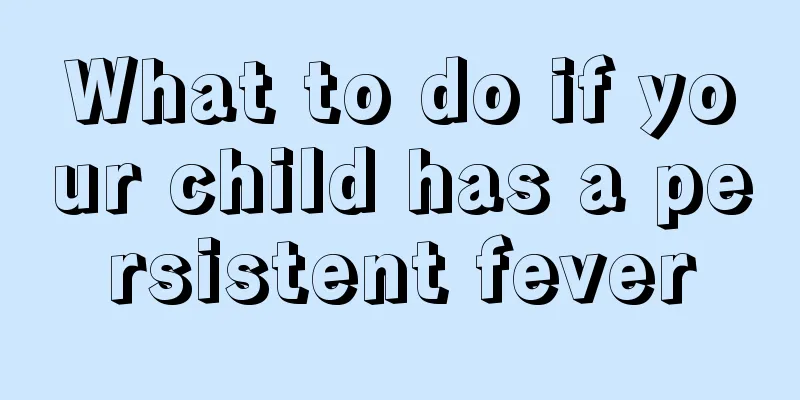What to do if your child has a persistent fever

|
In life, we have no way to avoid the fact that some people are prone to persistent fever. For example, many young children have poor physical resistance, so they often have repeated fevers after being sick. Even if the fever subsides on the first day, the fever may rise again at night. This kind of persistent fever requires appropriate care. If it is not too serious, physical cooling can be performed at home. Cold compress If the high fever is unbearable, you can use cold compress to help lower your body temperature: place a wet cold towel on your forehead, wrists, and calves, and cover other parts of the body with clothing. When the cold compress reaches body temperature, it should be changed. Repeat until the fever subsides. You can also wrap ice cubes in a cloth bag and place it on your forehead. Heat If the body temperature is not too high, hot compress can be used to reduce the fever. Use a hot, wet towel to repeatedly wipe the patient's forehead and limbs to dissipate heat from the body until the fever subsides. However, if the body temperature rises above 39°C, do not use hot compresses to reduce the fever. Instead, use cold compresses to prevent the body temperature from rising further. Wipe your body Evaporation also has a cooling effect, and experts recommend using cold running water to help the skin dissipate excess heat. Although you can sponge your entire body, you should pay special attention to areas where body temperature is higher, such as the armpits and groin. Squeeze excess water out of the sponge and wipe one area at a time. Cover the rest with clothing so that body temperature can evaporate the water and help dissipate heat. Bath Sometimes a warm bath is the most relaxing thing, and it can also help relieve fever symptoms. Fluid replacement When you have a high fever your body sweats to dissipate the heat; but when you have a high fever your body loses too much water and closes its sweat glands to prevent further water loss, which prevents your body from dissipating the heat. The solution is to replenish fluids by drinking plenty of boiled water and fruit and vegetable juice. Fruit and vegetable juices are rich in vitamins and minerals, especially beet juice and carrot juice. If you want to drink tomato juice, choose a low-sodium product, and avoid solid foods during the fever until the condition improves. Use pain medication appropriately Pay attention to wearing appropriate clothes If you feel very hot, take off too much clothing so that the heat in your body can dissipate. However, if this causes you to shiver, it means that you are wearing too little clothing and should add more clothing until you are no longer cold. At the same time, do not make the room temperature too high. Doctors usually recommend that it should not exceed ℃. At the same time, the room should be properly ventilated to help recovery and maintain soft light to relax the patient. |
<<: What should I do if my child has purpura?
>>: Recurrent fever in children with viral infection
Recommend
Cold, cough and anti-inflammatory medicine for a 10-year-old child
Children are very important to their parents. Par...
Can children wear high heels?
Most women will wear high heels for the sake of b...
What is the standard for baby height and weight?
The height and weight standards for infants and y...
What to do if an eight-year-old child is zinc deficient
Nowadays, many children are lacking one thing or ...
Heart failure in infants
Nowadays, many children may have to go through th...
What to do if your 3-year-old baby has prickly heat
We all know that the weather is very hot in summe...
The reason why three-month-old babies fart smells bad
Many three-month-old babies have particularly sme...
How to pass gas when the baby falls asleep
Many mothers find that their baby’s belly is swol...
Why is the child late in speaking?
Generally speaking, babies can say some simple wo...
What causes chapped lips in children?
When people are young, their immune function is t...
What should I do if my child has encephalitis?
Encephalitis in children is the name of a disease...
What to do if a child has a low-grade fever
When babies are young, the most common phenomenon...
Does genetic metabolic disease make sense at the age of 3?
Genetic metabolic diseases are a type of disease ...
What should I do if my newborn baby doesn't sleep? I uploaded it wrongly. Request modification.
Newborns sleep much more than adults, and there a...
Are there any problems with children with small fontanelles?
When a child is born, it will arouse the curiosit...









